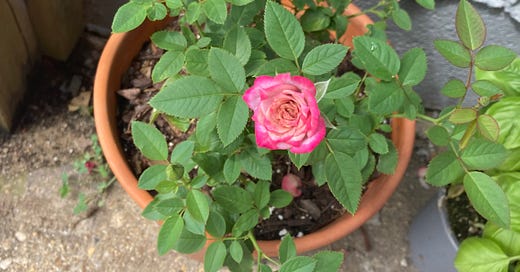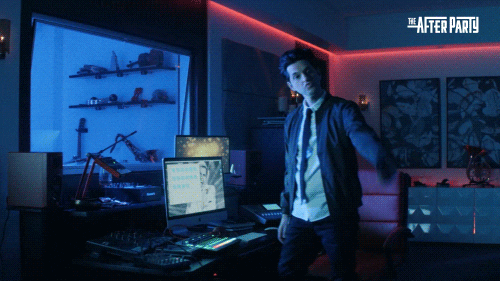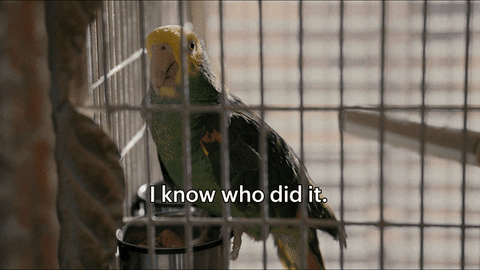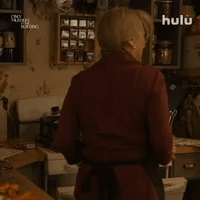A Tale of Two TV Mysteries
How The Afterparty is winning the murder sitcom war, and how Only Murders in the Building could get the magic back. | Pop Fly | Vol. 1 Iss. 2
Murder. Comedy. Big stars. A slightly meta look at the way we consume and frame our own stories. Two shows, both alike in first season dignity. Two shows headed for different later season fates. One great. One increasingly frustrating, bogged down in one-liners and big stars with nothing to do.
Only Murders in the Building is in the middle of its third season, while The Afterparty finished up its sophomore outing earlier this month. While The Afterparty managed to repeat most of its season one magic, Only Murders is struggling, not quite regaining the bittersweet fun it had already started to let slip in season two.
I’m going to try really hard to do this without spoiling the most recent seasons, which are both very new and people may not have finished. I will, however, spoil the first season of The Afterparty and the first two of Only Murders. You’ve been warned.
Some Are Born Great
Only Murders started with strong fundamentals: Steve Martin, Martin Short, and Selena Gomez make a fantastic onscreen team. (Selena Gomez continually going unrecognized at the Emmys for her part in this trio is deeply unfortunate.) The show’s premise, too, of true-crime obsessed amateur detectives confronted with the gore and complexity of a real murder, felt timely. But what really shone for me, in that first season, was the ways in which the murder and ensuing podcast were woven in with the three leads as people.
Short’s Oliver is desperate for a career win and to maintain his relationship with his son. Martin’s Charles is lonely and regretful. Gomez’ Mabel is traumatized and looking for answers.
There’s a moment in the pilot when Oliver finds out they really can make this true crime podcast, where he falls off the stairs of his son’s house and bounces back, a surreal callback to an art piece Oliver said he loved. This moment took the best of the show - Short as a performer, the show’s framing narration framing in each episode, and Oliver’s desperation, and distilled it down to one wonderful moment. When Oliver bounces back onto the stairs, Only Murders is more than a sitcom. It’s more than quips and even more than its central mystery. It’s a story about people and relationships that feel real.
The mystery itself, in season one, was also tied into those people and relationships through Mabel. The victim, Tim Kono, was Mabel’s childhood friend. Together, they were there the night another friend, Zoe, died. Ultimately, it becomes clear she was killed (mostly unintentionally?) by another on the edges of their social circle, Theo. A fourth friend, Oscar (AKA Tie-Dye Guy), went to prison for the girl’s death, and he becomes a suspect in Tim’s death as well. He’s innocent on both counts, and becomes a love interest for Mabel. Mabel is haunted by Tim, by his murder, by the things that happened when they were all teenagers. The murder and romance are tied up in the past and who Mabel is because of it. That’s why they work.
And why the ultimate answer to the season one mystery is so unsatisfying. Theo didn’t kill Tim Kono. Neither did Tie-Dye Guy. Charles’ bassoon player girlfriend (played wonderfully by Amy Ryan) did. The answer doesn’t fit the question. The murder is the essentially random work of a serial killer. It’s not the final piece to the emotional mysteries of the season.
And that is the challenge of a mystery, isn’t it? The destination matters, just as much as the journey.
Which means The Afterparty cheated, just a little bit. Because they put the focus as much as they possibly could on the journey.
The basic premise of Afterparty is that each suspect in the murder tells their version of the evening at a high school reunion and then afterparty. And each episode is told in a different genre based on how the character views themself and the events of the night. Aniq sees the story as a rom-com. Zoë, focused on her daughter, sees animation. Her ex-husband, Brett, sees an action movie.
The genre play is detailed and lovingly done. It also tells us so much about the characters. Some are played by famous faces, Tiffany Haddish most famous among them as the story’s detective, Danner. But most are basically “that guy” level comedic actors. You’ve seen them in something, but you don’t have huge assumptions about them at the start. So what genre they tell their own story in matters a lot. And it helps to enliven the search for clues.
Aniq and Danner and Yasper (Ben Schwartz, killing it (literally!)) are searching for clues, yes. But more so than Only Murders, The Afterparty is showing the audience the clues, asking them to notice the contradictions and omissions in each story. There’s a lot of trust put in the viewer to figure things out on their own
.If you’re asking the audience to find the answer, it has to make sense. And this one does. Ben Schwartz, it turns out, plays a fantastic heel turn. And he also has a good combination of some classic murder motives: money and revenge. (Rounding out the trio of all-timers is love, which I guess you could argue is what got Tim Kono killed, but you would lose the argument.)
Both shows would have come to the end of their first seasons more or less intact (save for the Amy Ryan reveal), if Only Murders had not ended with a very annoying post-script. Pre-script? Somehow both?
Only Murders season one started with Oliver and Charles told to evacuate the building, running down to find Mabel bent over a dead body in a tie-dye sweatshirt. A sweatshirt we associate all season with Tie-Dye Guy. And then, at the very, very end of the season, the body rolls out of Mabel’s arms to reveal it’s Bunny, a side character unrelated to the season one mystery. Not even a real suspect.
This prologue moment that started it all didn’t turn out to be related to the season one mystery at all. It’s a misdirect that’s actually a springboard to season two. Springboards are fine. Misdirects are fine. But this one felt a little like being lied to. It also felt like maybe the writers had this idea of Mabel with the body in the sweatshirt and then chickened out and kicked the can down the road.
Some Retain Greatness (And Some Don’t)
But let’s go back to The Afterparty. Season two reveals it to be essentially an anthology piece, with Aniq, Zoë, and Danner joined by a new cast of comedy all-stars. But even with all the new talent, the show keeps something key: long-standing relationships. In season one, the cast of murder suspects is made up of people who went to high school together. These relationships are long, full of history, full of opportunities for friendship and love and resentment –fertile ground for murder motive hunting. In season two, the suspects are the closest guests of a wedding. Friends and family who have, in many cases, known each other for a lifetime. I don’t think it’s a spoiler to say that those kinds of relationships also come with complications.
Season two, again, no spoilers, thrives on those relationships. The answer, when it comes, works because it’s grounded in the characters and their histories. They knew what worked in season one - Yasper killed because of things that happened years and years ago. Other than the ending, years-old traumas and resentments drove season one of Only Murders as well.
So of course the killer in season two of Only Murders did it for a podcast.
Which is disappointing, right? I’ve worked in radio. I love a podcast. But nobody is killing over a podcast.
Season two was, by virtue of its victim and murderer, a lot less rooted in Mabel’s past and the long-standing relationships of the characters. One of the suspects in the murder would have done it… to be president of the HOA? Definitely not on the list of classic motives.
There were two pretty successful plotlines in season two: who is Will’s dad (Oliver or Teddy) and Charles’ relationship to his ex-girlfriend’s daughter. These things weren’t all that related to the murder, but they were satisfying plot lines because the character relationships had history.
Season two also introduced a new love interest for Mabel, in what is becoming the show’s most boring pattern. I don’t remember what Cara Delevigne’s character was called. But Cara Delevigne was there, Tie-Dye Guy having barely been explained away early in the season. She was briefly a suspect in the murder. Why would she have killed her? Oops, she didn’t. And she didn’t have history with Mabel, either, which made it kind of hard to care.
And then by season three, Cara Delevigne is gone. We also have new and new-ish love interests for Charles and Oliver. And while I would definitely watch the rom-com Martin Short is starring in if it were a stand-alone, as part of a murder mystery it’s really not relevant.
Which brings us to the most pressing problem for Only Murders. At its heart, it’s a show with three great leads with great chemistry. And the show keeps splitting them up into different plots for no reason.
Do they need to get along all the time? Nope. Do they need to be together in every scene? Of course not. But does it make sense to take your greatest strength and spread it out across scenes filled with quips and characters whose names we can hardly remember? No. (Recently they not only had a one-liner about Three’s Company, they then had an explanation of the one-liner about Three’s Company.)
Give us Oliver and Charles and Mabel together. They can solve the mystery or not. They can have fun or fight or make a podcast. It doesn’t really matter. As long as they’re together.
Some Have Greatness Thrust Upon Them
If I had a magic wand to figure out post-strike seasons of these two shows, I’d go to Europe for The Afterparty and back to basics for Only Murders.
Aniq and Zoë are on vacation somewhere fancy and ridiculous. Monte Carlo, maybe? Or a villa outside of Paris? And they befriend a wealthy older woman who invites them to her house. (Don’t go, always very dangerous.)
There, they meet an eclectic group of apparent strangers, also mostly rich and ridiculous. And only when one of the party goes missing do Aniq and Zoë start to realize these people actually do know each other (long standing relationships!)
Our sleuths are reluctant, but they’re getting good at this, so they decide to help solve the crime. Also, they’re sort of at risk of getting murdered themselves, so they don’t have much choice. (It’s possible we need to get Haddish’s Detective Danner in there somewhere, but it’s not clear that her character is still in the mystery solving business, so we’ll see.)
This set up would let the show glory in more weird characters, in an opulent setting, and in one last ride for the central characters. This one definitely has to either end or move on to new people. Because how many times, statistically, can you be there for a murder? It would definitely start to get to you. All good things must end.
While I’m tempted to say that a fourth season of Only Murders would amount to beating a dead horse, I think it’s got one last good mystery in it, and the key is to lean on an old standard - the closed door mystery.
The podcast team always looks most closely at a core group of suspects, but it hasn’t done a truly closed system yet. And it would work well with the existing rules and strengths of the show.
Oliver is throwing a party. All the show’s best are there - Mabel and Charles, Theo and Teddy, Tie-Dye Guy, Uma, Cat Guy and his boyfriend, Jane Lynch as the stunt double, maybe Tina Fey is there if she has to be. (And no guest stars. Am I enjoying Meryl Streep and Paul Rudd? Absolutely. Did Amy Schumer need to be in season two? Absolutely not.) Their floor of the building goes on lockdown (maybe there’s a gas leak?), which means when they find the body the murderer must be someone on their floor. And, most importantly, they solve the murder in one night. The whole season lasts only until the sun comes up the next morning, and they’re still stuck in this one floor of the Arconia.
I care less about the details of the crimes. Mystery is not usually my genre, so when I show up for it I come for strong relationships and performances. If these shows come back, I hope they lean on their leads and tell a story where the characters, and the audience, have enough history to care about the destination and enjoy the journey.
Stuff I Would Have Put on Facebook in the Old Days
Work
In a part of my life with fewer gifs, I edited this piece on the white supremacist Active Clubs network, and the threat posed by decentralized extremism. NPR has also reported on the clubs and their targeting of LGBTQ+ events.
Watch
I recently rewatched both Princess Diaries movies. Anne Hathaway is a delight. The second movie does not care at all about the rules of this country set up in the first movie. And Chris Pine has been hot for decades.
Water
As the weather started to warm up this spring, I walked to the local garden center and bought my first outdoor plants. The nice people there asked what I was looking for and I explained I needed shade plants that would be hard for me to kill. (My record with indoor plants isn’t great.)
Here are my little baby plants in May:
And here they are this week, in September:
They’re not dead! In fact, they’ve thrived. I’d love to take credit, of course, for occasionally watering them and moving the pots so different ones get the most sun. But all summer I’ve watched as these little plants grew and grew —new leaves, new flowers, branching out and reaching for the sun. And I had nothing to do with that. It’s all written in the seeds themselves, a blueprint for all that life and growth.

In particular a shout-out to the mini-rose bush, who joined the gang as a birthday present in June. I was fully convinced I’d killed it, but it’s come back stronger than ever, flowering for months now. And even better, it’s the only one of the group that’s a perennial, so my hope is to let it hide out inside all winter and then go back to the sun come spring.
Whatever
Into the Woods opens tomorrow, which means I’ve been in tech rehearsals for nearly a week and now I’m exhausted. I’m also really intrigued by lighting design and have been learning more about the history of it, including this guy, who worked on 300 Broadway shows.









